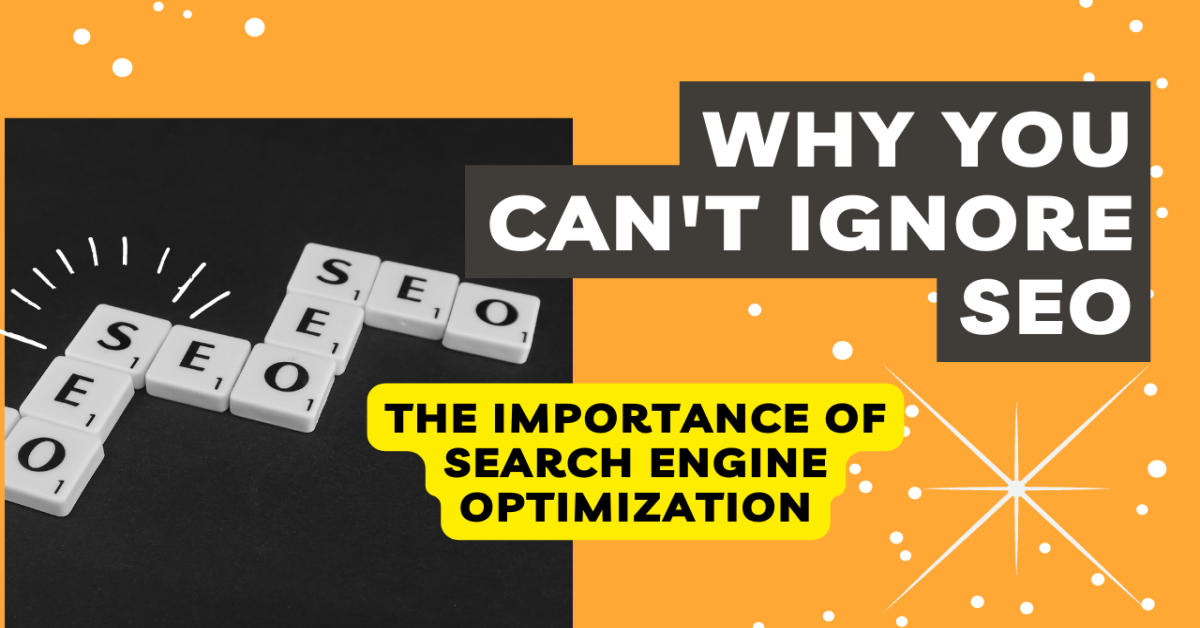If you’re running a business, it’s important to ensure you’re doing everything possible to get as much traffic to your website. It means that you can’t ignore search engine optimization (SEO). SEO is optimizing your website to appear higher in search engine results pages (SERPs). People looking for a product or service often turn to Google or another search engine to find what they need. If your website isn’t appearing near the top of the results, you’re missing out on a lot of potential traffic and revenue. This blog post will discuss the Importance of Search Engine Optimization and how you can start optimizing your website today!
What is SEO, and why does it matter?
Read our full blog post here to learn more about SEO and how it can benefit your business!
The role and importance of SEO
Search engine optimization (SEO) is the practice of improving the ranking of a website on search engines. The higher the ranking, the more likely people find the site.

Why does this matter? Because appearing on the first page of results, especially in the top three positions, can significantly increase traffic to your website.
According to a study, the first position on Google’s search results page receives 33% of traffic, compared to 18% for the second and 11% for the third positions. If you’re not ranking in the top three, you’re missing out on a large portion of potential traffic.
SEO is important for all businesses but can be especially beneficial for small businesses. Small businesses often have a smaller marketing budget and less name recognition than larger businesses. SEO can level the playing field and help small businesses compete with larger businesses by increasing their visibility in search engine results pages.
Factors that affect a website’s SERP ranking
Several different factors contribute to a website’s ranking on SERPs. These include the quality of the content, the relevance of the keywords, and the strength of the backlinks.

Content is one of the most important elements of SEO. The content on your website should be well-written, relevant, and keyword-rich. Keywords are words or phrases that people use to search for information. Including relevant keywords in your content helps search engines match your website with those searches.
Backlinks are links from other websites that point to your website. The more high-quality backlinks you have, the higher your website will rank on SERPs.
How to optimize your website for SEO
The first step to optimizing your website for SEO is to ensure that your site is well-structured and easy to navigate. Google and other search engines place a lot of importance on on-site structure when determining where to rank your website in the SERPs. If your site is difficult to navigate, it will likely not rank as highly as a site that is easy to use.

One way to optimize your website’s structure is to create a sitemap. A sitemap is a file that lists all of the pages on your website and their hierarchy. It helps search engines understand how your site is organized and makes it easier for them to crawl and index your content. You can create a sitemap using a tool like XML-Sitemaps.com.
Once you have created a sitemap, you can submit it to Google Search Console. Google Search Console is a free service that allows you to monitor your website’s performance on Google search results pages. It also provides valuable insights into how Google crawls and indexes your site.
Another important aspect of website structure is title tags and meta descriptions. Title tags are the text that appears in the search results when your website comes up. Meta descriptions are the short summaries that appear under your title tag. Both elements are important for SEO because they give searchers an idea of your website.
It’s important to use keywords in your title tags and meta descriptions, but you also want to ensure that they are accurate and relevant to your website’s content. Stuffing keywords into your title tag or meta description will hurt your SEO and frustrate users who click on your listing and end up on a site irrelevant to their search.
Use social media marketing for SEO
Social media marketing is another important aspect of SEO. Social media platforms like Facebook, Twitter, and Instagram can significantly impact your website’s SERP ranking. It’s because social media signals are one of the factors that search engines use to determine where to rank your website.

When you share your website’s content on social media, it helps to increase the number of inbound links to your site. Inbound links are an important ranking factor for SEO because they show search engines that your website is popular and relevant. The more inbound links you have, the higher your website will rank in the SERPs.
In addition to increasing your inbound link count, social media can also help to increase the amount of traffic that comes to your website. When you share your content on social media, it exposes your website to a wider audience. It can lead to more people visiting your site, which can, in turn, lead to more sales and conversions.
How to use analytics tools to improve your site’s performance on Google search engine results pages (SERPs)
Google Analytics is a free analytics tool that you can use to track your website’s traffic and performance. You can also use it to improve your SEO.
Google Analytics provides valuable insights into how people find your website and what they do once they get there. You can use this information to improve your website’s SERP ranking by making changes to your website’s title tags, meta descriptions, and content.

Another useful analytics tool for SEO is Google Search Console. Google Search Console is a free service that allows you to monitor your website’s performance on Google search results pages. It also provides valuable insights into how Google crawls and indexes your site.
You can use Google Analytics and Google Search Console to improve your website’s SEO. By tracking your website’s traffic and performance, you can identify areas where your site needs improvement. Then, you can make changes to your title tags, meta descriptions, and content to improve your site’s SERP ranking.
SEO is important because it helps your website rank higher in search engine results pages (SERPs). In turn, it can lead to more traffic and more sales.
The importance of mobile-friendly website design in SEO
Mobile-friendly website design is important for SEO because it helps your website rank higher in mobile search results. Mobile search is becoming increasingly important as more and more people use their smartphones and other mobile devices to access the internet.
Google has stated that they are working on a new algorithm that will give preference to mobile-friendly websites in the search results. This algorithm is not yet live, but it is expected to be rolled out soon.
If you want your website to rank higher in mobile search results, you must ensure that it is designed for mobile devices. It means using a responsive design or a mobile-specific design. It also means ensuring your website’s content is optimized for mobile devices.
Conclusion
By now, you should understand what SEO is and why it’s so important for your business. If you’re not already implementing basic SEO strategies on your website, now is the time to start!
SEO can be a complex and ever-changing field, but by following the tips in this blog post, you can see some real results. If you’re not sure where to start, contact a web development or SEO agency, and they will be able to help you take your website to the next level!
- Google Ads Customer Service Woes: An Urgent Call for Improvement - January 17, 2024
- Microsoft Copilot Levels Up: Introducing Copilot Pro for $20/Month - January 17, 2024
- Understanding SEO Perfection According to Google’s John Mueller - January 2, 2024

